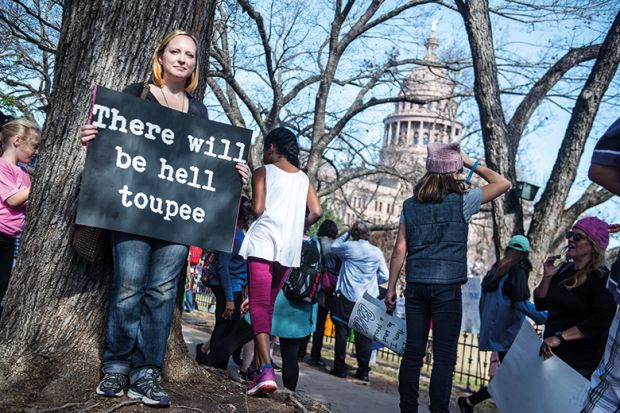Some predictions of where Donald Trump would lead the country verged on the apocalyptic in the immediate aftermath of his victory in last November’s presidential election. The new president’s repeated and vindictive clashes with the free press – which he has described as “the enemy of the people” – and his willingness to assert unsubstantiated “alternative facts” raised dark questions about how he would treat higher education, the other societal institution that prizes independence and is dedicated to pursuit of the truth.
Since then, Trump has run smack into the US system of checks and balances. After violent protests ended the appearance at the University of California, Berkeley of right-wing commentator Milo Yiannopoulis, Trump tweeted: “If U.C. Berkeley does not allow free speech and practices violence on innocent people with a different point of view – NO FEDERAL FUNDS?” But neither the president nor the federal government has the power to carry out such a threat against an individual institution. And Trump’s proposal to eliminate funding for the National Endowments for the Arts and the Humanities has met with weak support on Capitol Hill.
The biggest threat to the academy will not come from Washington. It will come from the statehouses, whose more conservative legislators have been emboldened by Trump’s presidency. Already, several state legislatures have begun efforts to restrict higher education’s independence and academic freedom.
This trend began before the presidential election, with the assault on tenure in Wisconsin spearheaded by the state’s governor, Scott Walker. After the election, bowing to political pressure, the governing board of the University of Wisconsin System voted to allow “independent, substantial reviews” of faculty every five years, opening the door to the firing of tenured professors.
Rick Brattin, a Missouri state representative, has gone so far as to call tenure “un-American”, and a bill he introduced in January advocated eliminating it for all new faculty. Similar legislation has been introduced in Iowa, where a bill seeks to require public universities to gather voter registration information on prospective faculty hires to ensure that neither Democrats nor Republicans outnumber one another by more than 10 per cent.
Legislators in Tennessee, meanwhile, have introduced a bill that would require faculty to allow students (with an eye to the conservative ones) to speak their minds even if their comments are irrelevant to the content being taught. Speech may be regulated only if it is in a “content-neutral manner”; how this can be accomplished is unexplained. State universities “shall strive to remain neutral on the public policy controversies of the day”. And they must punish people – including protesters – who interfere with the rights of others. In a similar vein, the lieutenant governor of North Carolina, Dan Forest, has proposed eliminating speech codes that restrict speech, and punishing students who protest against or shout down speakers.
Such provisions call into question the very purpose of a university in a democracy. Universities require independence. At its heart, tenure exists to ensure academic freedom. It provides blanket protection from retaliation for speaking out: a protection that the First Amendment of the US Constitution can provide only through long and costly court battles. A teacher who is not permitted to guide and manage classroom discussions is nothing but a talking head. And a “neutral” university cannot articulate what the evidence says about climate change, healthcare or the status of race relations if that can be contradicted with “alternative facts” – because this would lead to punishment for expressing a mere “opinion”.
The good news is that many conservative states have long supported strong, independent public higher education. And much of the legislation described above has yet to garner sufficient support to move forward. But universities have some soul-searching to do. They need to do a better job of explaining to politicians and to the electorate the importance of academic freedom. And they need to actively create forums, on campus and off, to bring people from different political orientations together to consider important questions facing their state and broader society.
In an era of unprecedented polarisation, this won’t be easy. But the alternative is to live in a parallel universe to those who brought Trump to power – and who are empowering lasting change at the state level.
Matthew Hartley is professor of education and associate dean for academic affairs at the University of Pennsylvania’s Graduate School of Education.
POSTSCRIPT:
Print headline: States of concern
Register to continue
Why register?
- Registration is free and only takes a moment
- Once registered, you can read 3 articles a month
- Sign up for our newsletter
Subscribe
Or subscribe for unlimited access to:
- Unlimited access to news, views, insights & reviews
- Digital editions
- Digital access to THE’s university and college rankings analysis
Already registered or a current subscriber?






